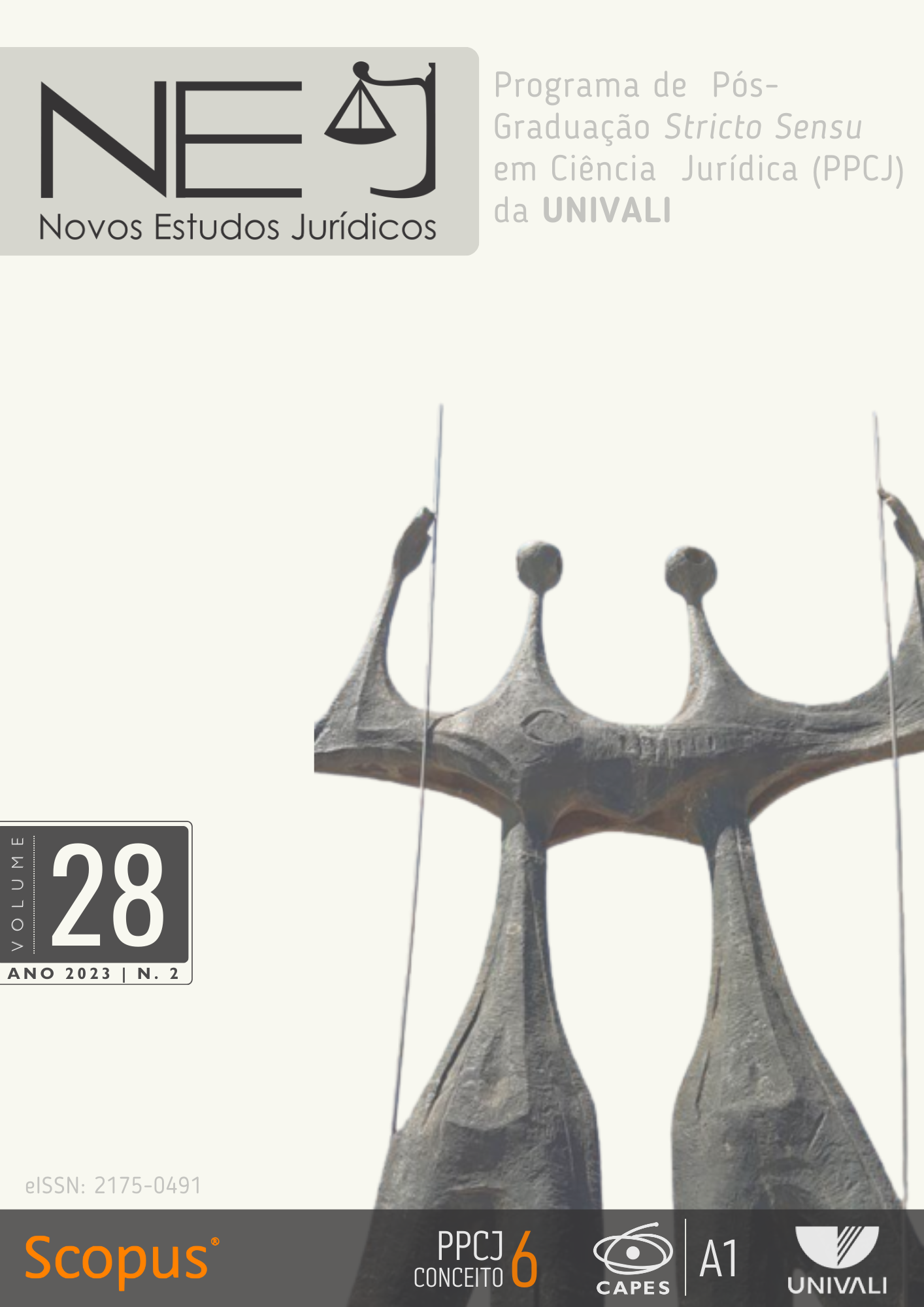THE PROTECTION OF THE FUNDAMENTAL RIGHTS OF INDIGENOUS PEOPLE IN ISOLATION
DOI:
https://doi.org/10.14210/nej.v28n2.p311-336Keywords:
Indigenous people, Fundamental rights, IsolationAbstract
Contextualization: Nowadays, the notion of "indigenous peoples" should refer not only to a social conglomerate, but also to the political, legal, social, and academic struggles surrounding their legal protection. Identifying a group as indigenous goes beyond cultural isolation or potential extermination. Many social groups labeled as "indigenous" have not experienced cultural isolation, and some have never been in danger of being exterminated.
Objective: To conduct a diagnosis of the situation of isolated indigenous populations on the Peru-Brazil border, which requires first determining the "legal situation" that could be applicable to these groups. This will involve examining certain cross-cutting subjects serving as the basic theoretical framework, including: i) Neoconstitutionalism and the Constitutional State; ii) Legal pluralism; and iii) Indigenous peoples in the Constitutional State.
Methodology: This research uses the inductive method in the investigation phase, the Cartesian method in the data processing, and the inductive logical basis in the report of the results.
Results: There is a wide range of claims originating from indigenous peoples. This multiplicity of claims leads to two possible outcomes: denial of the requests or recognition of the demands. In the latter case, victories won by indigenous groups need to be materialized in the formulation of enforceable and concrete rights in the applicable States.
Downloads
References
ANAYA, James y GROSSMAN, Claudio. El Caso Awas Tingni vs. Nicaragua: Un Nuevo Hito en el Derecho Internacional de los Pueblos Indígenas. Revista IIDH, n. 11, 2003.
BRANDT, Hans-Jürgen. Normas, valores y procedimientos en la justicia comunitária. Lima: IDL, 2002.
CANÇADO TRINDADE, Antonio. La Humanización del Derecho Internacional y los Límites de la Razón de Estado. Revista da Facultade de Direito da Universidade Federal de Minas Gerais, Belo Horizonte, n. 40, p. 11-23, 2001.
CRAWFORD, James; KOSKENNIEMI, Martii; RANGANATHAN, Surabni. Sovereignty as a Legal Value. Cambridge UK: Cambridge University Press, 2012 DOI: https://doi.org/10.1017/CCO9781139035651.009
CHARTERS, Claire; STAVENHAGEN, Rodolfo (ed.). El Desafío de la Declaración - Historia y Futuro de la Declaración de la ONO sobre Pueblos Indígenas. Copenhague: Grupo Internacional de Trabajo sobre Asuntos Indígenas, 2010.
DE SOUSA SANTOS, Boaventura. Pensar el Estado y la sociedad: Desafíos Actuales. Buenos Aires: Waldhunter, 2009.
FREEMAN, Michael; NAPIER, David. Law and Anthropology: Current Legal Issues. Madrid: Editorial Trotta. 2007.
HOWARD, Michael. Transnationalism and Society: An Introduction. Edit. McFarland & Co. in Jefferson, 2011.
KINGSBURY, Benedict. Reconciling Five Competing Conceptual Structures of Indigenous Peoples´ Claims in International and Comparative Law. New York University Journal of International Law and Politics. n. 34, 2001. DOI: https://doi.org/10.1093/oso/9780198298755.003.0003
MEREMINSKAYA, Elina. El Convenio 169 de la OIT sobre Pueblos Indígenas y Tribales. Derecho Internacional y Experiencias Comparadas. Estudios públicos, n. 121, p. 213-276, 2011. DOI: https://doi.org/10.38178/cep.vi121.375
MILLER, Robert. The History of Federal Indian Policies. SSRN, mar. 2010. Disponible: http://dx.doi.org/10.2139/ssrn.1573670 DOI: https://doi.org/10.2139/ssrn.1573670
PORTES, Alejandro; GUARNIZO, Luis; LANDOLT, Patricia. The Study of Transnationalism: Pitfalls and Promise of an Emergent Research Field. Ethnic and Racial Studies. v. 22, n. 2, 1999. DOI: https://doi.org/10.1080/014198799329468
ROJAS ZOLEZZI, Martha; ROJAS ZOLESSI, Enrique. El ciudadano indígena: el problema de la relación entre sujetos colectivos y el Estado liberal. Una visión desde la Amazonia. Anthropologica, v. 18, n. 18, p. 196-210, 2000. DOI: https://doi.org/10.18800/anthropologica.200001.011
STAFFEN, M. R.; ZAMBAM, N. J. Direito Global e desigualdades: um estudo a partir do “Direito dos Povos” de John Rawls. Revista Eletrônica do Curso de Direito da UFSM, [S. l.], v. 10, n. 1, p. 243–258, 2015. DOI: 10.5902/1981369419243. Disponible: https://periodicos.ufsm.br/revistadireito/article/view/19243. Aceso: 26 jul. 2023.. DOI: https://doi.org/10.5902/1981369419243
STAFFEN, Márcio Ricardo. On the authority of transnational law. Estudios Socio-Jurídicos, Bogotá, vol. 23, n. 1, p. 465-482, 2021. DOI: https://doi.org/10.12804/revistas.urosario.edu.co/sociojuridicos/a.8175
STAVENHAGEN, Rodolfo. Los Derechos Indígenas: Nuevo Enfoque del Sistema Internacional. Revista IIDH. 1991.
Downloads
Published
How to Cite
Issue
Section
License
Na qualidade de autor(es) da colaboração, original e inédita, sobre o qual me(nos) responsabilizo(amos) civil e penalmente pelo seu conteúdo, após ter lido as diretrizes para autores, concordado(amos) plenamente com as Políticas Editorias da Revista Novos Estudos Jurídicos - NEJ e autorizo(amos) a publicação na rede mundial de computadores (Internet), permitindo, também, que sua linguagem possa ser reformulada, caso seja necessário, sem que me(nos) seja devido qualquer pagamento a título de direitos autorais, podendo qualquer interessado acessá-lo e/ou reproduzi-lo mediante download, desde que a reprodução e/ou publicação obedeçam as normas da ABNT e tenham a finalidade exclusiva de uso por quem a consulta a título de divulgação da produção acadêmico científico.





























